|
De Tsjechisch-Israëlische dichter, schrijver, criticus en componist Max Brod werd geboren in Praag op 27 mei 1884. Zie ook alle tags voor Max Brod op dit blog.
Uit: Streitbares Leben
„Ich brachte Werfel sofort mit Weltsch und Kafka zusammen. Wir hatten damals einen Kult der schönen Wälder und Bäche rings um Prag, Werfel wurde gleich eingeführt, fröhlich schwammen wir eines Sommertages viele Stunden lang (in meiner Erinnerung hat er überhaupt kein Ende) in den reinen, silbernen Strömungen der Sazawa. – Am nächsten Tag stürmte Mama Werfel meine Wohnung. Was mir denn einfalle! Ich sei doch der Ältere und müsse Verstand haben! Ihr Junge sei puterrot vor Sonnenbrand heimgekehrt und liege jetzt an hohem Fieber darnieder. Er werde die Matura nicht machen können... So schlimm kam es nun nicht, immerhin machte ich mir Vorwürfe, daß ich an die besonders weiße zarte Haut des jungen blonden Alkaios nicht gedacht hatte. Wir andern waren abgehärtet.
Ich sandte die Gedichte an den Mann mit der buntgestickten Weste. Er lehnte sie entschieden ab. Ich besitze noch einen Stoß Briefe, in denen Axel Juncker auf meine Überredungskünste reagiert. Endlich siegte ich doch. Und in Berlin, bei meiner ersten Vorlesung („es ist erstaunlich, mit wie geringem Akzent dieser tschechische Dichter deutsch spricht“, schrieb ein Kritiker. Dabei habe ich es nie so weit gebracht, korrekt tschechisch zu sprechen), legte ich zuletzt meine Werke weg, um aus den Druckbogen des damals noch völlig unbekannten Werfeischen „Weltfreund“ eine ganze Reihe von Gedichten zu lesen. Es war Werfeis Premiere vor einem Weltforum – eine kleine Sensation.
Es dauerte nicht lange, und der Kriegsausbruch spülte alle anderen Probleme in den Orkus. Kam der junge Krieger zu kurzem Urlaub heim, so war er, der Weltfreund, von Sarkasmen und Menschenverachtung verzehrt. Einmal erzählte er mir, wie er sich im Feld immer vorgestellt hatte, selbst gleichgültige Personen (wie zum Beispiel die Besitzerin des Hauses, in dem seine Eltern wohnten) würden ihn mit froher Rührung begrüßen, den aus so schwerer Gefahr Heimgekehrten. Und was sagte die Hausbesitzerin in Wirklichkeit beim Wiedersehen? Werfel ahmte virtuos ihre gralzende Baßstimme nach: „Herr Werfel, wissen Sie schon das Neueste? Der Herr Reitler im dritten Stock hat gekündigt.“
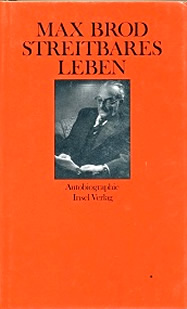
Max Brod (27 mei 1884 - 20 december 1968)
Cover
De Estse schrijver Kaur Kender werd geboren op 27 mei 1971 in Estland. Zie ook alle tags voor Kaur Kender op dit blog.
Uit: Through Peaceful Eyes (Vertaald door Jurgen Kaljuvee)
“We drove to Kütiorg to the Open Studio Art Exhibition. I have no friends living further Kütiorg in Estonia. We were there for 20 minutes. Looked at art. We drank a Jagermeister (0.5 liters, about 200) while driving. We were back in Tallinn just in time to go to Othello club (700 was spent on gas). Two of Maria’s friends joined us in the car. One secretarutka, the other probably a prostitutka. Wearing very expensive clothing. Picture beautiful. We bought a one-liter bottle of Hennessy (18 000). We drank the bottle in the car. Maria did not want to. I was driving. The day before I had bought 2 grams of cocaine (1100 a gram). We did one gram on a CD in the car. Maria did not do it. She never does it. I went home, put on the brand new white Gant shirt and black Armani jeans.
I paid for the cover fees at the Othello club (400? I cannot recall exactly). Maria introduced me to three Russian thugs. One thug I already knew for a long time. We drank Hennessy XO (4000 a bottle, I bought at least two). At 4 o’clock, another thug in a white shirt and black jeans arrived. Straight from the prison. He had had 4 years. Everybody was happy. Everybody was wearing white shirts and black jeans. Many had tattoos. I vaguely recall a moment: we were jumping up and down with four thugs in the middle of the dance floor and we were screaming: “Davai, davai, davai!” I was unconscious with happiness because I felt that I was home, I was with my people.
Maria dragged me to the car because I was getting tired. I wanted her to spend the night at my place. She was dodging. I tried to convince her. She said no. I got angry. She smiled: “But you said that you have not had a TV set for 8 years and that you read and write. Why don’t we go to my place because we can then watch a movie together in the morning.” We went to Kallavere. Police patrol. Luckily we were not pulled over. I had 12 000 in cash on me. You don’t need more because there are no bigger fines. We were lucky. Maria showed me her poems. She had three notebooks of them. In Russian. Powerful stuff.”
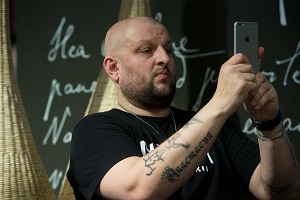
Kaur Kender (Estland, 27 mei 1971)
De Nederlandse journalist, schrijver en kunsthandelaar Adriaan Harrie Venema werd geboren in Heiloo op 27 mei 1941. Zie ook alle tags voor Adriaan venema op dit blog.
Uit: Schrijvers, uitgevers en hun collaboratie.
“Aan twee Nederlandse letterkundigen wier houding in de bezettingsjaren een nadere studie meer dan waard is, is een biografie gewijd. J.W.F. Werumeus Buning, geen nationaal-socialist, kreeg een biograaf, P. Hijmans, die een uitvoerige studie aan hem wijdde; George Kettmann jr., wel een nationaal-socialist, kreeg Wim Huberts als biograaf, zij het dat deze zijn studie een ‘biografische schets’ noemde, een opstap naar een uitgebreidere biografie. Een goede biograaf zal altijd trachten aan te tonen welk belang zijn biografie heeft, dat wil zeggen welk belang zijn onderwerp - de beschreven persoon - heeft. Hij kan daarbij gemakkelijk in een val trappen: de bewondering voor dichters als Werumeus Buning en Kettmann bijvoorbeeld is vaak moeilijk te verenigen met de kritiek op hun handelen in de bezettingsjaren. Een voorbeeld van een biograaf die níét in deze val trapte is Wam de Moor in diens tweedelige biografie van J. van Oudshoom. De biografen van Kettmann en Werumeus Buning daaren tegen zijn, zoals ik wil aantonen, wel in deze val getrapt.
Hijmans, in zijn beschrijving van het handelen van Werumeus Buning in de bezettingsjaren, heeft een verhaal geschreven vol onwaarheden en verdraaiingen. Dat is ernstig, want latere geschiedschrijvers zullen aangewezen menen te zijn op de studie van Hijmans, die er nota bene op is gepromoveerd. Dan krijgen we dat Max van Rooy in een verhaal over de houding van schrijvers in de oorlog over Werumeus Bunings toetreding tot de Kultuurkamer vergoelijkend schrijft: ‘Na grote aarzeling en onder druk van een vriendin, was dit ook het geval met de hoofdredacteur van De Gids, J.W.F. Werumeus Buning, die overigens duidelijk verzetsliteratuur heeft geschreven en in 1943 de inleiding bij het tweede deel van het illegale Geuzenliedboek.
Van Rooy kwam tot zijn oordeel omdat hij niet anders kon: over Werumeus Buning bestond enkel de biografie van Hijmans. Werumeus Buning heeft, laat ik dat maar direct vooropstellen, géén ‘verzetsliteratuur’ geschreven. Wel komen vrij vaak gedichten van hem voor in clandestiene uitgaven; maar clandestiene uitgaven bevatten lang niet altijd verzetsliteratuur (hierover en over het aandeel van Werumeus Buning in de clandestiene uitgaven: Dirk de Jong. en Lisette Lewin.”
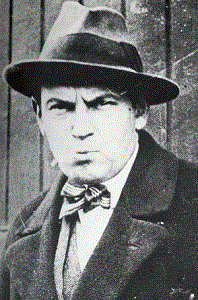
Adriaan Venema (27 mei 1941 – 31 oktober 1993)
Werumeus Buning
De Engelse schrijver Arnold Bennett werd geboren in Hanley, Staffordshire, op 27 mei 1867. Zie ook alle tags voor Arnold Bennett op dit blog.
Uit: How to Live on 24 Hours a Day
“If my typical man wishes to live fully and completely he must, in his mind, arrange a day within a day. And this inner day, a Chinese box in a larger Chinese box, must begin at 6 p.m. and end at 10 a.m. It is a day of sixteen hours; and during all these sixteen hours he has nothing whatever to do but cultivate his body and his soul and his fellow men. During those sixteen hours he is free; he is not a wage-earner; he is not preoccupied with monetary cares; he is just as good as a man with a private income. This must be his attitude. And his attitude is all important. His success in life (much more important than the amount of estate upon what his executors will have to pay estate duty) depends on it. What? You say that full energy given to those sixteen hours will lessen the value of the business eight? Not so. On the contrary, it will assuredly increase the value of the business eight. One of the chief things which my typical man has to learn is that the mental faculties are capable of a continuous hard activity; they do not tire like an arm or a leg. All they want is change—not rest, except in sleep.”
(…)
“The most important of all perceptions is the continual perception of cause and effect—in other words, the perception of the continuous development of the universe—in still other words, the perception of the course of evolution. When one has thoroughly got imbued into one's head the leading truth that nothing happens without a cause, one grows not only large-minded, but large-hearted. It is hard to have one's watch stolen, but one reflects that the thief of the watch became a thief from causes of heredity and environment which are as interesting as they are scientifically comprehensible; and one buys another watch, if not with joy, at any rate with a philosophy that makes bitterness impossible. One loses, in the study of cause and effect, that absurd air which so many people have of being always shocked and pained by the curiousness of life. Such people live amid human nature as if human nature were a foreign country full of awful foreign customs. But, having reached maturity, one ought surely to be ashamed of being a stranger in a strange land!”
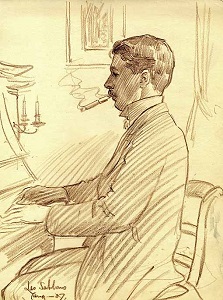
Arnold Bennett (27 mei 1867 - 27 maart 1931)
Houtskooltekening door Frederick Marriott, 1907
De Duitse dichter en schrijver Richard von Schaukal werd geboren op 27 mei 1874 in Brünn. Zie ook alle tags voor Richard von Schaukal op dit blog.
Damals
Sonntag war's. Wir gingen durch das Korn,
wo verborgen blaue Blumen brannten.
Ob sie deinen Blick zu Boden bannten?
Unsichtbare Grillen sangen vorn.
Folgten wir dem lockenden Getön?
Was ich zu dir sprach, hab ich vergessen.
Was du schwiegst, kannst du es noch ermessen?
Sommer war es, und die Welt war schön.
Kind, du bist rein
Kind, du bist rein
Mein Bild in deiner Seele seh ich nicht,
Denn das ist dein
Und also lauter Licht.
Demütig tret ich bei dir ein,
Dem alles, was du hast, gebricht.
Und dennoch kann es sein,
Daß meine Seele mit dir spricht,
Als wär sie nicht allein,
Als wären sie zu zwein,
Ein Reimpaar im Gedicht.
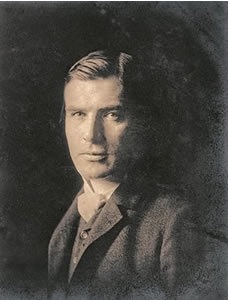
Richard von Schaukal (27 mei 1874 – 10 oktober 1942)
In 1903
De Poolse schrijver, journalist, ontdekkingsreiziger en globetrotter Ferdynand Ossendowski werd geboren op 27 mei 1876 in Dvina. Zie ook alle tags voor Ferdynand Ossendowski op dit blog.
Uit: Beasts, Men And God
“The stranger, running his eyes constantly over all of us and over everything about the room, began to take off his skin coat after putting his rifle in the corner. He was dressed in an old leather blouse with trousers of the same material tucked in high felt boots. His face was quite young, fine and tinged with something akin to mockery. His white, sharp teeth glimmered as his eyes penetrated everything they rested upon. I noticed the locks of grey in his shaggy head. Lines of bitterness circled his mouth. They showed his life had been very stormy and full of danger. He took a seat beside his rifle and laid his ax on the floor below.
“What? Is it your wife?” asked one of the drunken soldiers, pointing to the ax.
The tall peasant looked calmly at him from the quiet eyes under their heavy brows and as calmly answered:
“One meets a different folk these days and with an ax it is much safer.”
He began to drink tea very greedily, while his eyes looked at me many times with sharp inquiry in them and ran often round the whole cabin in search of the answer to his doubts. Very slowly and with a guarded drawl he answered all the questions of the soldiers between gulps of the hot tea, then he turned his glass upside down as evidence of having finished, placed on the top of it the small lump of sugar left and remarked to the soldiers:
“I am going out to look after my horse and will unsaddle your horses for you also.”
“All right,” exclaimed the half-sleeping young soldier, “bring in our rifles as well.”
The soldiers were lying on the benches and thus left for us only the floor. The stranger soon came back, brought the rifles and set them in the dark corner. He dropped the saddle pads on the floor, sat down on them and began to take off his boots. The soldiers and my guest soon were snoring but I did not sleep for thinking of what next to do. Finally as dawn was breaking, I dozed off only to awake in the broad daylight and find my stranger gone. I went outside the hut and discovered him saddling a fine bay stallion.
“Are you going away?” I asked.
“Yes, but I want to go together with these —— comrades,’” he whispered, “and afterwards I shall come back.”
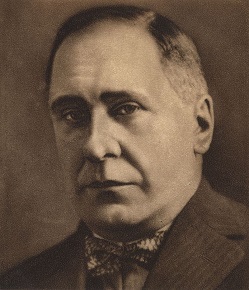
Ferdynand Ossendowski (27 mei 1876 – 3 januari 1945)
In 1903
De Duitse dichter en schrijver Moritz August von Thümmel werd geboren op 27 mei 1738 in Schönefeld. Zie ook alle tags voor Moritz August von Thümmel en voor August von Thümmel op dit blog.
Uit: Reise in die mittäglichen Provinzen von Frankreich im Jahre 1785-1786
„Die volle Sonne hatte Mühe mich zu wecken. Als ich die Augen aufschlug, mußte ich mich einigemal fragen, wo ich wäre und wohin ich wollte, eh' ich es deutlich erfuhr. Das erste, was mir beifiel, war ein Wechsel auf Herrn Frege, einen Sohn des berühmten Banquiers dieses Namens zu Leipzig. Ich lernte einen artigen und gefälligen Mann an ihm kennen. Sein Deutsch war mir beinahe lieber, als das, womit ich gestern an der Wirthstafel so angenehm überrascht wurde; denn er zahlte mir Geld, und bat mich auf morgen zu Tische. Mein heutiger Mittag hat nichts für mein Tagebuch abgeworfen. Es wollten keine Berlinerinnen kommen, so sehr ich mich darnach umsah. Unter den Anwesenden fand sich nicht Ein Auge, in das ich hätte blicken mögen; und es war eben so gut: denn ich konnte um so viel ruhiger der Erholung pflegen, die mir nach der Nachtwache von gestern sehr nöthig war.
Mit diesem Gefühle in allen Gliedern, und einem Pack Zeitungen, die für die Gäste da lagen, schlich ich wohl gesättigt nach meinem Zimmer. Hier pflanzte ich Bastianen, der mir sie vorlesen sollte, meinem Lehnstuhle gegenüber. Es ging schlecht. – Margot, sagte er zu seiner Entschuldigung, lese auch nicht besser. – Ich setzte den Prologus an seine Stelle, einige Zeilen nachher auch den Epilogus: aber der Zeitungstext und ihre Stimmen paßten so widrig zusammen, daß ich vor der Hand für das beste hielt, auf die Bequemlichkeit eines Vorlesers Verzicht zu thun. Es greift doch nichts die Gehörnerven so empfindlich an, als werthlose Neuigkeiten, die uns in einem hochtrabenden Tone verkündiget werden. Der erste deklamirte: daß Ludewig der Vielgeliebte zwei Tage und drei Nächte mit Madam Dubarri auf dem Schlosse zu Meudon zugebracht habe. – Der andere: daß der Herzog von Orleans entschlossen sei, eine Reiherbeitze zu halten. – »Das mag er,« unterbrach ich den Epilogus: »trage nur die unnützen Blätter wieder in den Saal, damit nicht etwa gar jemand darauf warte.«
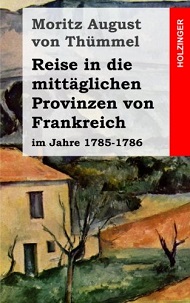
Moritz August von Thümmel (27 mei 1738 – 26 oktober 1817)
Cover
De Amerikaanse schrijver Herman Wouk werd geboren op 27 mei 1915 in New York. Zie ook alle tags voor Herman Wouk op dit blog.
Uit:The Winds of War
“The Russian Revolution is a radical change in history. The abolition of private property has created a new world. You may like it or detest it, but it’s new. Hitler’s socialism was a sham to get a mob of gangsters into power. He’s frozen the German economy just as it was, smashed the labor unions, lengthened the working hours, cut the pay, and kept all the old rich crowd on top, the Krupps and Thyssens, the men who gave him the money to run for office. The big Nazis live like barons, like sultans. The concentration camps are for anybody who still wants the socialist part of National Socialism."
(...)
"I’m sorry. I’m impressed with Hitler’s ability to use socialist prattle when necessary, and then discard it. He uses doctrines as he uses money, to get things done. They’re expendable. He uses racism because that’s the pure distillate of German romantic egotism, just as Lenin used utopian Marxism because it appealed to Russia’s messianic streak. Hitler means to hammer out a united Europe.... He understands them, and he may just succeed. A unified Europe must come. The medieval jigsaw of nations is obsolete. The balance of power is dangerous foolishness in the industrial age. It must all be thrown out. Somebody has to be ruthless enough to do it, since the peoples with their ancient hatreds will never do it themselves. It’s only Napoleon’s original vision, but he was a century ahead of his time.”

Herman Wouk (New York, 27 mei 1915)
Cover
De Amerikaanse schrijver Dashiell Samuel Hammett werd geboren in Saint Mary's County (Maryland), op 27 mei 1894. Zie ook alle tags voor Dashiell Hammett op dit blog.
Uit: The Maltese Falcon
“Spade rocked back in his chair and asked: "Now what can I do for you, Miss Wonderly?"
She caught her breath and looked at him. She swallowed and said hurriedly: "Could you--? I thought--I--that is--" Then she tortured her lower lip with glistening teeth and said nothing. Only her dark eyes spoke now, pleading.
Spade smiled and nodded as if he understood her, but pleas-antly, as if nothing serious were involved. He said: "Suppose you tell me about it, from the beginning, and then we'll know what needs doing. Better begin as far back as you can.
"That was in New York."
"Yes."
"I don't know where she met him. I mean I don't know where in New York. She's five years younger than I--only seventeen--and we didn't have the same friends. I don't suppose we've ever been as close as sisters should be. Mama and Papa are in Europe. It would kill them. I've got to get her back before they come home."
"Yes," he said.
"They're coming home the first of the month."
Spade's eyes brightened. "Then we've two weeks," he said.
"I didn't know what she had done until her letter came. I was frantic." Her lips trembled. Her hands mashed the dark handbag in her lap. "I was too afraid she had done something like this to go to the police, and the fear that something had happened to her kept urging me to go. There wasn't anyone I could go to for advice. I didn't know what to do. What could I do?"
"Nothing, of course," Spade said, "but then her letter came?"
"Yes, and I sent her a telegram asking her to come home. I sent it to General Delivery here. That was the only address she gave me. I waited a whole week, but no answer came, not another word from her. And Mama and Papa's return was drawing nearer and nearer. So I came to San Francisco to get her. I wrote her I was coming. I shouldn't have done that, should I?"
"Maybe not. It's not always easy to know what to do. You haven't found her?"
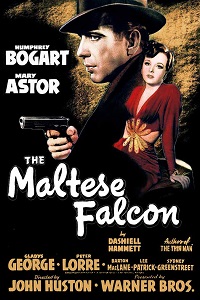
Dashiell Hammett (27 mei 1894 – 10 januari 1961)
Affiche voor de film uit 1941
|



